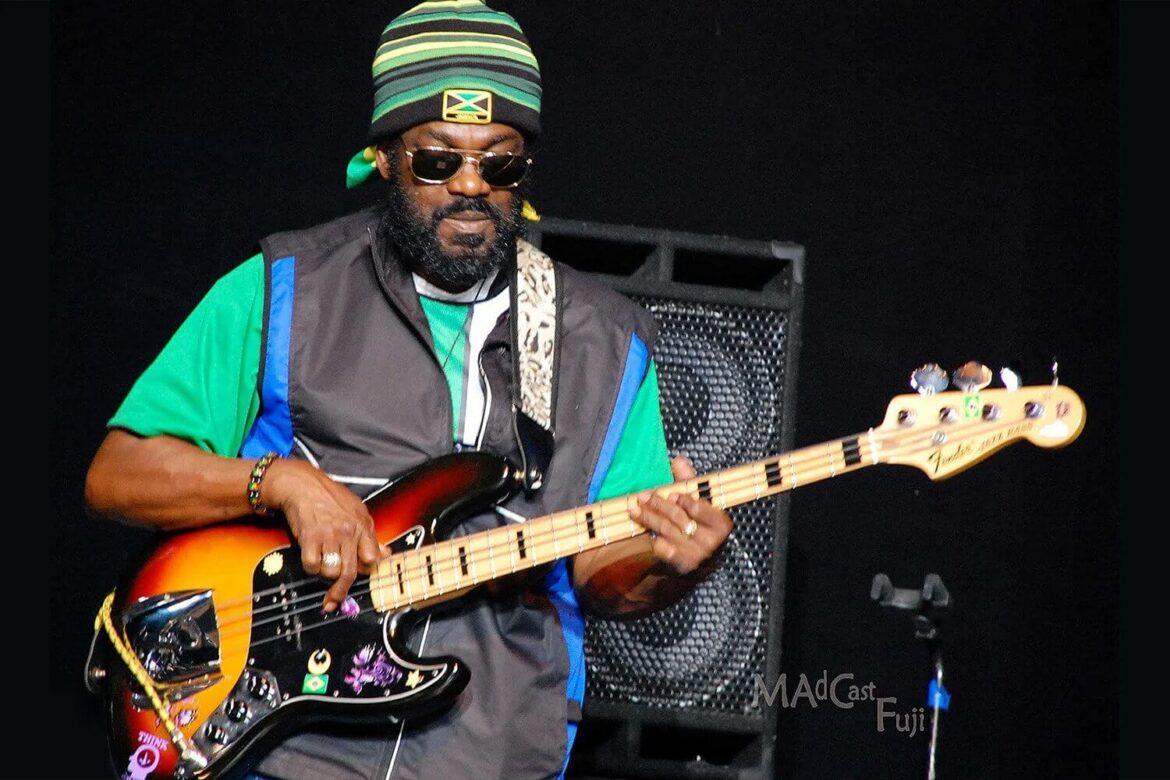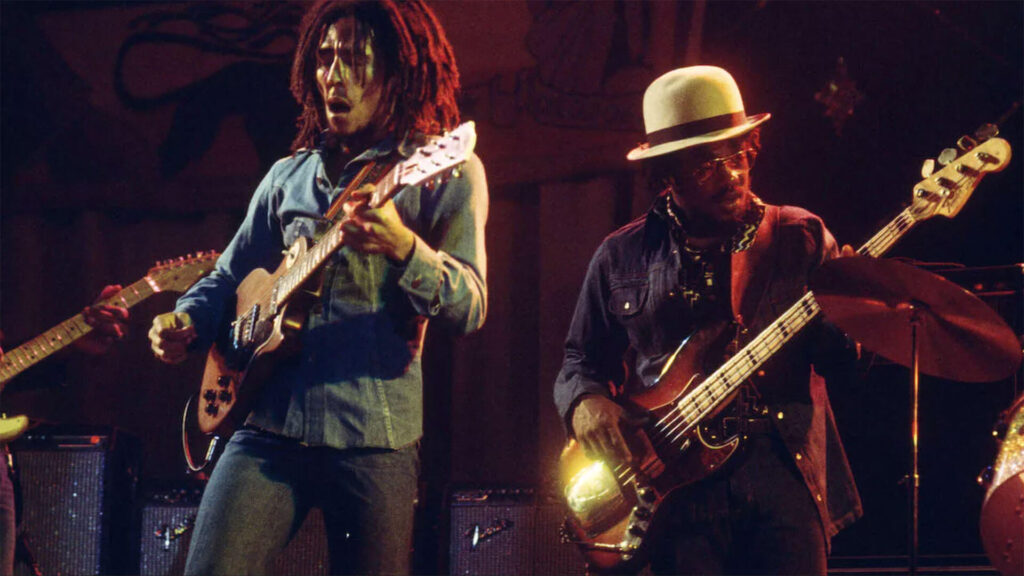
Aston Family Man Barrett was born Aston Francis Barrett on November 22, 1946, in Kingston, Jamaica, and emerged from humble beginnings to become a pivotal figure in the reggae music scene. As a member of the Barrett family, Aston grew up in a musical environment that nurtured his talents and instilled in him a deep appreciation for the rhythms and melodies that characterized Jamaican music. Raised in a Rastafarian household, Barrett’s early influences included not just the vibrant sounds of ska and rocksteady but also the spiritual teachings of Rastafari, which would inform his artistic journey throughout his life.
Barrett’s connection to music was evident from an early age. His brothers, including bassist and guitarist Carlton Barrett, were integral to his musical education. Together, they honed their skills in local music venues, immersing themselves in the vibrant cultural scene of Kingston. This early exposure to various musical styles laid the foundation for what would become a prolific career in music.
The Rise to Prominence
In the late 1960s, Barrett’s life took a significant turn when he joined Bob Marley and the Wailers, a group that would soon redefine reggae music on a global scale. Barrett quickly established himself not only as a talented musician but also as an innovative bandleader and arranger. His proficiency on the bass guitar and keen understanding of music theory enabled him to craft complex rhythms that became a hallmark of the Wailers’ sound.
Aston Family Man Barrett’s contributions to the Wailers extended beyond performance; he played a crucial role in the arrangement and production of many of the band’s seminal albums, including Catch a Fire, Rastaman Vibration, and Exodus. His unique ability to blend traditional Jamaican sounds with international influences helped to create a sound that resonated with audiences worldwide. Barrett’s style was characterized by its deep, syncopated grooves and melodic basslines, which provided the foundation for Marley’s powerful lyrics and soulful vocals.
Family Man: A Nickname with Significance
The nickname “Family Man” was not merely a moniker; it reflected Barrett’s personal ethos and professional approach. He was known for his nurturing spirit, often taking younger musicians under his wing, fostering their talents, and emphasizing the importance of unity and collaboration within the band. His commitment to family extended beyond the musical realm; Barrett was a devoted father and husband, embodying the principles of love and community that Rastafarianism espouses.
This familial ethos translated into the music he produced. Aston Family Man Barrett’s arrangements often featured rich harmonies and interwoven rhythms, mirroring the interconnectedness of family and community. His work with the Wailers and subsequent projects demonstrated his belief in music as a unifying force, capable of transcending cultural and geographical boundaries.
Collaboration with Bob Marley
Aston Family Man Barrett’s collaboration with Bob Marley was transformative for both artists. Together, they crafted a body of work that not only defined reggae music but also addressed social and political issues affecting Jamaica and the broader world. Barrett’s basslines were instrumental in creating the distinctive sound of the Wailers, characterized by its infectious grooves and poignant lyrics.
One of Aston Family Man Barrett’s most notable contributions was to the iconic song “One Love,” where his rhythmic bassline complemented Marley’s message of unity and peace. Barrett’s ability to create a sonic landscape that supported Marley’s visionary lyrics was crucial in elevating the music to new heights. Songs like “No Woman, No Cry” and “Redemption Song” further showcased their collaborative genius, combining powerful narratives with irresistible melodies.
Barrett also played a vital role in the production of Marley’s albums, often working alongside producer Chris Blackwell at Island Records. His keen ear for detail ensured that the music was polished and impactful, allowing it to resonate with audiences across the globe.
Post-Marley Career and Legacy
Following Marley’s untimely death in 1981, Barrett continued to uphold the legacy of reggae music. He formed his own band, the Wailers, and toured extensively, ensuring that the music of Bob Marley and the Wailers reached new generations. Barrett’s dedication to preserving and promoting reggae music was evident in his numerous collaborations with both established and emerging artists, as he sought to share the genre’s rich cultural heritage.
In addition to his work as a performer, Aston Family Man Barrett was also involved in music production, contributing to various projects that highlighted the sounds of reggae and Rastafarian culture. His work included collaborations with artists like Peter Tosh, Bunny Wailer, and even contemporary reggae musicians, showcasing his versatility and commitment to the genre.
Aston Family Man Barrett’s impact on music extended beyond the stage and studio. He was a mentor to many young musicians, guiding them through the intricacies of songwriting, arrangement, and performance. His willingness to share knowledge and experience helped to cultivate a new generation of reggae artists, ensuring the continuity of the genre he loved.

Cultural Significance
Aston “Family Man” Barrett’s influence on reggae music cannot be overstated. His innovative approach to bass playing and song arrangement laid the groundwork for many musicians who followed in his footsteps. The deep grooves and rhythmic complexities that characterize his work have become a staple of reggae music, influencing countless artists across genres.
As a Rastafarian, Barrett also contributed to the global understanding of the Rastafarian movement through his music. The themes of social justice, unity, and spirituality that permeate his work resonate with audiences far beyond Jamaica, inspiring listeners to seek harmony and connection in their lives.
In 2023, Aston Family Man Barrett was recognized for his contributions to music with various awards and honors, solidifying his status as a reggae legend. His legacy continues to inspire musicians and fans alike, proving that music can be a powerful tool for change and connection.
Final Years and Passing
Aston Family Man Barrett‘s influence on reggae and his role as a mentor to many artists ensured that his spirit would live on through the music he helped create. Tributes poured in from around the world, celebrating his contributions to the genre and the indelible mark he left on the music community.
Aston Family Man Barrett’s passing is a reminder of the fragility of life, but also of the enduring power of music to connect, heal, and inspire. As fans continue to listen to the songs he helped create, Aston “Family Man” Barrett will forever be remembered as a key figure in reggae history—a man whose love for family, community, and music transformed the landscape of popular music and brought people together across cultures and generations. His legacy is not just in the notes he played, but in the hearts he touched and the messages of hope and unity he championed through his art.
Aston Family Man Barrett died of heart failure after a series of strokes in Miami, Florida on February 3, 2024, at the age of 77.
Check out Aston Family Man Barrett on Amazon.
Check out Bob Marley and the Wailers on Amazon.
.

